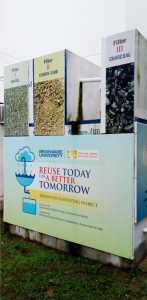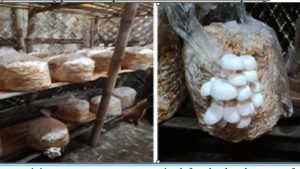“The Agriculture and Allied sector witnessed marginal growth of 0.6 percent in 2015-16 followed by a substantial recovery of 6.8 percent in 2016-17 that fell by almost a percent to 5.9 percent in the following year, 2017-18,” the 2020-21 Annual Report of Department of Agriculture, Cooperation and Farmers’ Welfare, Ministry of Agriculture and Farmers’ Welfare states. The report further states that in 2018-19, India witnessed a sharp fall to 2.4 percent that has since recovered to 4 percent in 2019-20 at 2011-12 base price.
Process of rainwater harvesting and BWU’s role
A report by the Food and Agriculture Organisation of the United Nations states that agriculture is both a major cause and casualty of water scarcity. “Farming accounts for almost 70 percent of all water withdrawals, and up to 95 percent in some developing countries. We will have to use our natural resources more wisely as time goes on and when it comes to water there is no exception,” the report states. In this context, rainwater harvesting has become an important technology in farming. The departments of Agriculture and Biotechnology of Brainware University have undertaken certain initiatives to lend a helping hand in the agricultural community.

A Rain Water Harvesting Project under Unnat Bharat Abhiyan for the practical exposure of the students regarding the field as well as keeping in mind the welfare of rural people has been undertaken by the university.
Brainware University adopted five villages of North 24 Parganas, West Bengal. These villages are severely affected by arsenic which gets dissolved in the groundwater table. Keeping this in mind, a model rainwater harvesting unit in the university campus. The water stored in these models is used for drinking. Furthermore, two water tanks are also utilised in Faldi primary school and Dongaria School as part of this project.
Mushroom Cultivation Project

With an aim to develop the economic condition of the rural people, the ‘Mushroom Cultivation Project’ has been taken up by the university. The purpose of choosing mushroom is because it has been cultivated throughout the year and also, the mushrooms cultivation are not very specific to temperatures.
“As a nutrient for mushroom growth and development we basically are planning to develop Vermiculture . Vermicompose will be grow there. We are using most agri-waste products: cow dung, organic manual as well as farm manuals for developing this vermicompost,” Dr. Koushik Biswas, HOD, Agriculture Department, Brainware University, said when asked about this initiative.
This project also imparts training to farmers regarding commercial farming so that farmers can get a chance to enhance their skills as well as their daily earning. Mushrooms is a product of commercial farming as it is basically cheap as well as provides enough nutrition.
Future plans
While enquiring about the future plans in this segment, the Department of Agriculture stated that it is also looking forward to develop hydroponic system by using waste products such as plastic bottles,thermocol,unused pipes and other waste products can be utilised since Plastic cannot be destroyed the only option left is to recycle the plastic.
“ Liquid medium is the place where discarded materials will be used and plants will grow there. Furthermore, this condition of hydroponic system where plants are continuously getting their nutrients due to which plants grow faster is our motto of developing hydroponic system in this University for green vegetables,” Dr. Biswas addeed.
With the evolving modern technologies to preserve water and in the field of agriculture, the initiatives undertaken by Brainware University will certainly be an additional help to the surrounding farming community.